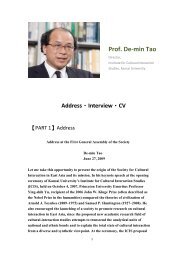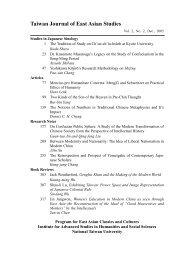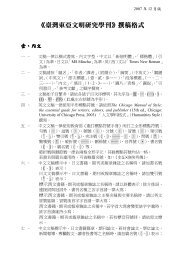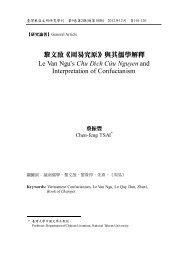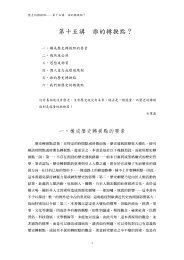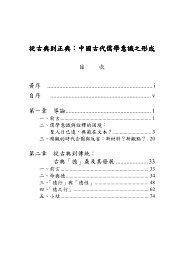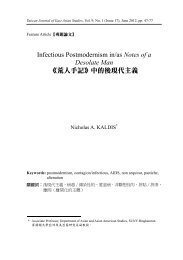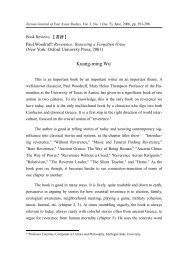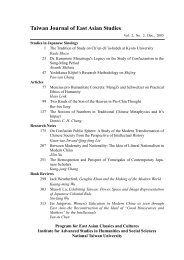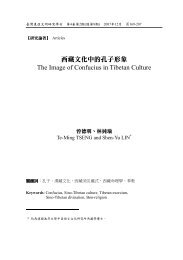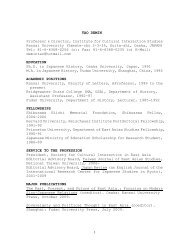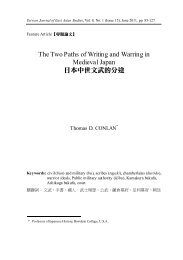臺灣東亞文明研究學刊 - 東亞經典與文化研究計畫 - 國立臺灣大學
臺灣東亞文明研究學刊 - 東亞經典與文化研究計畫 - 國立臺灣大學
臺灣東亞文明研究學刊 - 東亞經典與文化研究計畫 - 國立臺灣大學
Create successful ePaper yourself
Turn your PDF publications into a flip-book with our unique Google optimized e-Paper software.
Jeng-Guo CHEN Scottish Discussions of Indian Effeminacy in the Eighteenth Century 153<br />
effeminacy established a crucial trope in how the Orient was to be depicted by<br />
subsequent writers.<br />
One of Montesquieu's grand themes is that luxury was the bedeviled concubine<br />
of despotism, while virtue could defy such an undesirable union. 3 He explained the<br />
collapse of the Syrian Empire not through foreign aggression but through internal<br />
corruption, the inevitable result of luxury. The great empire of the Romans had<br />
fallen for the same reason:<br />
Luxury, vanity, and effeminacy, which had prevailed through all ages in the<br />
Asiatic courts, triumphed more particularly in that of Syria: the evil infected<br />
the common people and the soldiers, and the very Romans themselves. 4<br />
Beware the lairs of luxury! In the British eighteenth-century mind, it was not the<br />
Levant or Marco Polo's China that epitomized affluence and richly adorned ease: it<br />
was India. Where there was trade there was affluence, as Adam Smith wrote.<br />
Although Montesquieu's ideas about the impact of physical factors such as terrain<br />
and weather on national character were contested by David Hume, his ideas about<br />
luxury appear to have convinced all of Scotland's leading thinkers. Many of these<br />
men were drawn to Montesquieu's thesis on national character because of their<br />
conviction that manners were no less consequential than laws and wealth in shaping<br />
the social orders and strengthening national defense. As trade with India filled<br />
3 Roberto Romani, National Character and Public Spirit in Britain and France, 1750-1914<br />
(Cambridge: Cambridge University Press, 2002). On the origins of the European concept of<br />
Oreintal despotism, see The Birth of the Despot: Venice and the Sublime Porte (Ithaca: Cornell<br />
University Press, 1993). For a detailed and genealogical study of the concept of Oriental despotism<br />
in French literature, see Alain Grosrichard, The Sultan's Court: European Fantasies of the East<br />
(London: Verso, 1998). For a critique of the West's misinterpretation of Oriental politics and urban<br />
civilization, see Patricia Springborg, "The Contractual State: Reflections on Orientalism and<br />
Despotism," History of Political Thought, 8, 3 (winter, 1987), pp. 395-433.<br />
4 Charles de Secondat, Baron de Montesquieu, Consideration of the Fall of the Roman Empire, The<br />
Complete Works of M. de Montesquieu, vol. 3 (London, 1777), pp. 36-37.<br />
v



